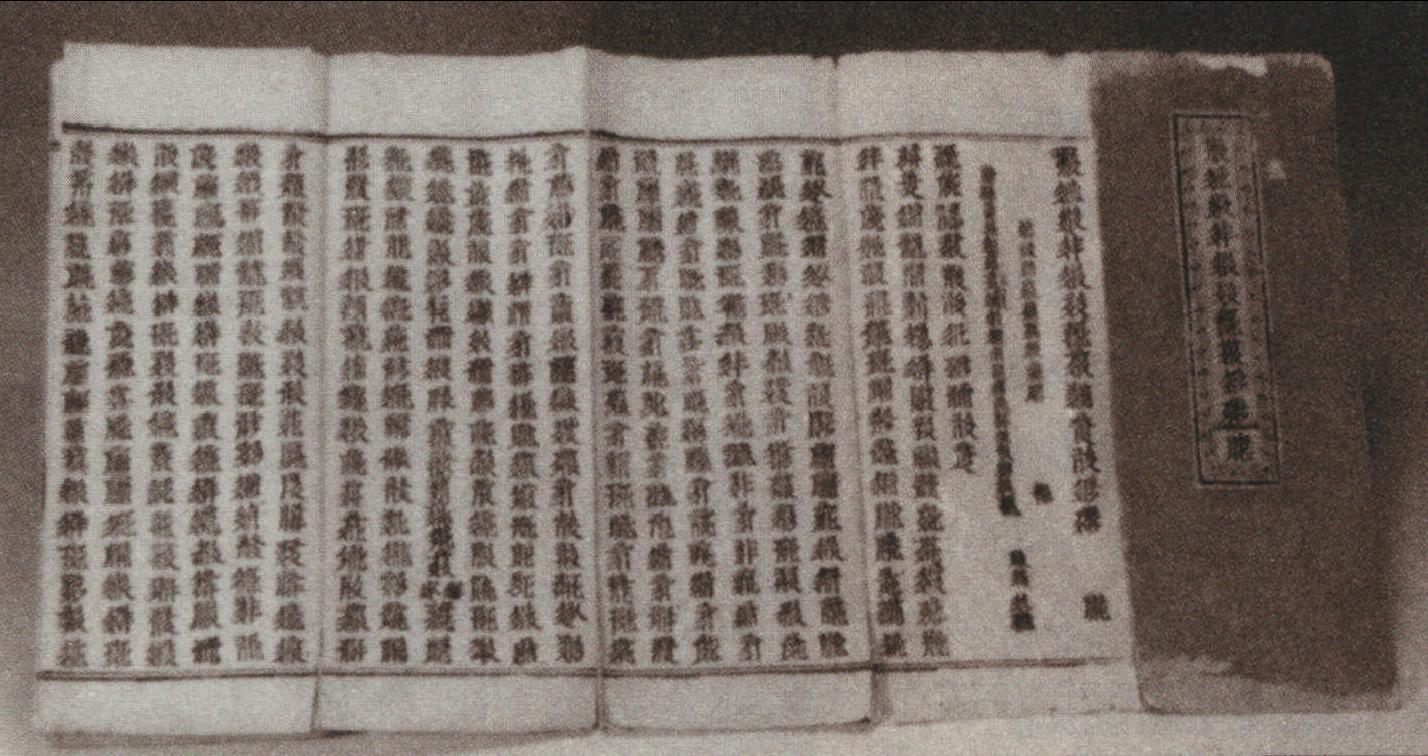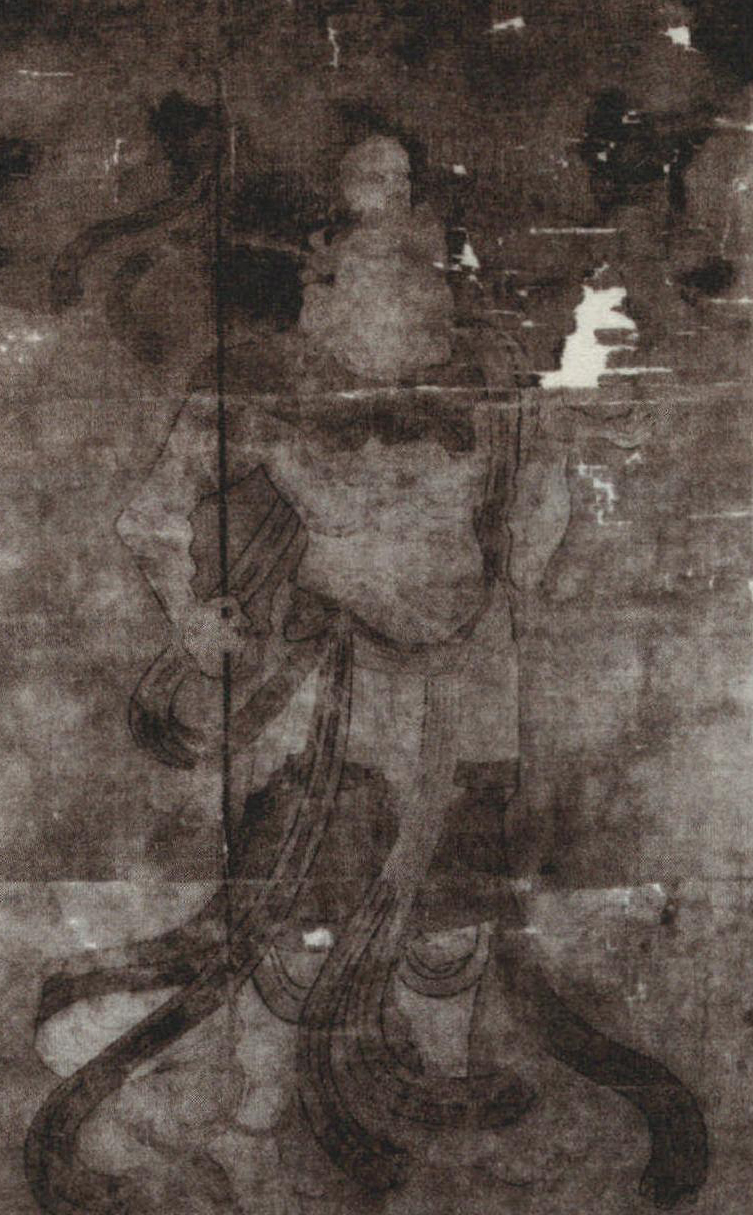秉 常 (1061~1086),西夏皇帝。夏毅宗谅祚长子。1067~1086年在位。梁氏 (?~1085),西夏皇后、皇太后。毅宗谅祚皇后,惠宗秉常生母。党项族。
夏拱化五年(1067),秉常七岁继位,朝政大权由梁太后把持。梁太后原先是谅祚朝国相没藏讹庞的儿媳,因与当朝皇上谅祚私通,后来又把国相没藏讹庞策划弑君谋反的计划报告给朝廷,帮助谅祚粉碎政变阴谋,诛掉了没藏氏家族的隐患。梁氏因此立了大功而被正式迎娶入宫,又立为皇后。梁皇后先把弟弟梁乙埋任为家相。谅祚去世后,梁氏的儿子秉常继承皇位,她贵为太后,又执掌朝政,便把弟弟乙埋再提升为国相,并把朝政大权交给了他。不久梁乙埋又将自己的女儿嫁给秉常,也被立为皇后,乙埋还逐步把梁家的人分别安排在宫内外的重要位置上,梁氏家族完全控制了夏国的所有枢要命脉,皇帝秉常不过是个傀儡而已。夏天赐礼盛国庆元年 (1069),梁太后废除谅祚朝时推行的 “汉礼” ,恢复实行 “蕃礼”。她还不惜采取一切措施打击、排斥皇族势力。夏大安三年(1076),秉常亲政后,也非常仰慕中原汉文化,对中原王朝的政治制度也有研究。大安七年 (1080),他下令全国撤去 “蕃礼” ,恢复“汉礼”。这一举措,与太后的政见完全相反,引起她的强烈不满。后又听说皇上竟然把 “河南地” (曲野河地区有争议的一片土地)归还宋朝,梁太后再也无法忍受了,于夏大安八年 (1081),发动宫廷政变,“夺秉常政” ,将皇帝软禁在兴庆府西北的木寨行宫,自己再次出来主持朝政。但是,她这种肆意妄行,引起皇族和多数大臣的反对。他们对梁氏家族专权早已不满,于是纷纷采取消极对抗的办法,各自拥兵自重,不听梁氏指挥,夏国形势陷入危机,随时有爆发动乱的可能。

Characters of Western Xia
西夏文《大方广佛华严经》

西夏彩绢质护法力士图
Picture of Buddhism Guarding muscleman of Western Xia
当西夏国内皇族与后族相互斗争、国内动荡的时候,宋朝却经过变法,国力增强,积极开边,对吐蕃和西夏,在军事上都采取较前强硬的政策。宋熙宁年间,曾打败过吐、夏联军。元丰四年 (1081),又动员三十万大军分五路进攻西夏。次年,又在叫永乐 (今陕西米脂北,无定河东岸)的地方筑城,打算以这个据点作为前进阵地,进而夺取西夏横山一带的土地 (今陕西北部绥德、米脂、榆林、横山、靖边一带)。九月初,永乐城建成,宋神宗给新城赐名为银川寨。但是,不论是宋朝对西夏用武取得多大成绩,还是西夏抗宋取得什么胜利,都给双方带来人力、物力的巨大损失。此时,宋朝需要边境和平,减少战争,恢复和发展经济,改变人民生活。西夏则更需要和平,因为西夏皇帝秉常被囚数年,国内矛盾加深,人心不稳,已直接威胁到梁氏的专权,所以梁太后也很需要对内安定人心,对外争取与宋朝和解。为此,不得不在夏大安十年 (1083 )六月,让秉常复位,但实权仍握在梁氏手中。接着又连续派遣使臣向宋朝上表请和。宋也恢复了对西夏的岁赐。
梁太后执政时,虽然战事不断,但在国内仍有大规模的佛事活动。夏天赐礼盛国庆四年 (1072),夏向宋朝派专使进献马匹赎买大藏经,这是西夏王朝第六次,也是最后一次向宋廷求购佛经。现在,研究人员发现,从留存下来的西夏文佛经的题款中可以看出,翻译于梁太后与秉常时期的佛经占了大多数。天祐民安元年 (1090),西夏王朝最终全部完成三千五百多卷西夏文佛经的翻译工作,也正是在梁氏执政时期。
夏天安礼定元年 (1085)二月,国相梁乙埋病逝,由儿子梁乞逋继任国相。十月,梁太后去世。至此第一代梁氏专权结束。次年 (1086)七月,秉常去世,时年二十六岁,谥 “康靖皇帝” ,庙号惠宗,墓号献陵。皇位由三岁的皇子乾顺继承。皇太后是已故前国相梁乙埋的女儿梁氏。皇后又是现任国相梁乞逋的女儿,西夏朝又开始了第二代梁氏专权时期。
Bing Chang (1061-1086),an emperor of Western Xia,was the eldest son ofEmperor Yizong and he reigned from 1067 to 1086. Lady Liang (?-1085) was the wife of Emperor Yizong,Liang Zuo and the mother of Emperor Huizong,Bing Chang. She was of Tangtu nationality,respectfully admitted as Empress Liang andEmpress Dowager Liang.
In the fifth year of the Gonghua reign of Western Xia regime,when he was 7years old,Bing Chang succeeded to the throne. But the state power was actually under
the control of Empress Dowager Liang,who was originally the daughter-in-law of the former Counselor-in-chief Mozang Epang. She had had affairs with the late emperor Liang Zuo,and later was formally appointed to Empress after she helped Emperor LiangZuo smash Epang's coup plot and eliminate Mozang's clans. Then Empress Liangassigned her younger brother Liang Yimai as a high-ranking official. When Liang Zuo died and his son succeeded to the throne,Liang came into power as Empress Dowager.She promoted Liang Yimai to counselor-in-chief and handed the state power over tohim. Soon afterwards,Liang Yimai married his daughter to Emperor Bing Chang as hisempress,and gradually he managed to put his family members on important positionsoutside and inside of the imperial court,with the result that emperor Bing Chang wasonly a puppet in his hands.
In the first year of the Tiancilishenguoqing reign of Western Xia regime (1069),Empress Dowager Liang abolished the customs of Han nationality performed during Liang Zuo's reign and recovered the traditional customs of Western Xia. Meanwhile,she spared no effort to persecute and exclude royal kinsmen. In the third year of the Da'an reign of Western Xia regime (1076),when Bing Chang personally managed court affairs upon coming of age,like his late father,he admired Han nationality's culture,too and made some research on the political system of Song Dynasty. In the seventh year of the Da'an reign (1080),he proclaimed to abolish Western Xia's manners,and recover Han's manners,which ran against Empress Empress Dowager Liang's policy. When she heard the Emperor returned a disputed land in Quye River area to Song Dynasty,she could not bear it any longer. In the eighth year of the Da'an reign (1081),she staged a palace coup,seized the political power from Bing Chang,and confined him to Muzhai palace in the northwest of Xingqin Prefecture. She arrogated the power to herself again.Her autocracy drew a counterblast from the royal clans and many ministers. They turned a deaf ear to the orders made by Empress Dowager Liang,and assumed importance by massing troops. Western Xia regime fell into a great crisis,in which aconvulsion might occur at any moment.
During the turbulent period when the Emperor's clans and Empress's clans struggled with each other violently in Western Xia,the national strength of Song Dynasty improved greatly after a reform and thereafter it began to pursue a hard-line military policy toward Tubo and Western Xia. The Xining reign of Song Dynasty saw the failure of combined troops of Tubo and Western Xia. In the fourth year of the Yuanfeng reign (1081),Song Dynasty launched 300,000 soldiers to attack Western Xia along five routes. The next year,they built a city in Yongle (in the north of presentday Mizhi County,Shaanxi Province,and in the eastern bank of Wuding River),intending to take the city as a forward position to seize the area of Hengshan (presentday north of Shaanxi Province,including Suide,Mizhi,Yulin,Henshan and Jinbian).Early in September,the construction of Yongle City was completed,and Emperor Shenzong of Song Dynasty named it as Yinchuan Stockaded Village. In fact,whether Western Xia or Song Dynasty won a victory,they both suffered heavy losses in manpower and material resources. During that period of time,Song Dynasty needed border-peace to develop economy. Empress Dowager Liang also needed peace toreverse the turbulent situation,which was caused by the house confinement of Emperor Bing Chang. Therefore,firstly,she restored Bing Chang to the throne in June,the tenth year of the Da'an reign of Western Xia regime (1083),but she still held real power in her hands. Secondly,she sent envoys to Song Dynasty to ask for peace. Then Song Dynasty resumed the annual tribute to Western Xia regime.
During the reign of Empress Dowager Liang,there were some large-scale Buddhist practices though battles erupted frequently. For example,in the fourth year of the Tiancilishenguoqing reign (1072),Western Xia sent some expresses to Song Dynasty to present horses in exchange for Buddhist classics. That was the sixth time and also the last time that they had bought Buddhist classics from Song Dynasty. Nowadays,researchers found out that most Buddhist classics in Western Xia language were translated during the reign of Empress Dowager Liang and Emperor Bing Chang. In the first year of the Tianyoumingan reign (1090),just when Empress Liang was in power,the translation of 3,500 volumes of Buddhist classics was accomplished. In the first year of the Tian'anliding reign (1085),counselor-in-chief Liang Yimai died of illness,and his son Liang Qipu succeeded to his post. In October,Empress Dowager Liang passedaway,so the autocracy by the first generation of Liang's clans ended. In July of the next year (1086),Bing Chang died at the age of 26,posthumously admitted as Emperor Kangjing and worshipped as Emperor Huizong. His resting place was named Xianlin Mausoleum. His three-year-old son Qian Shun succeeded to the throne. The daughter of the late counselor-in-chief Liang Yimai was appointed to Empress Dowager,and the daughter of counselor-in-chief Liang Qibu to Empress. Then came the autocracy by the second generation of Liang's clans.Ⓔ
本文地址: https://www.yishiweijian.com/renwu/2022123813.html
文章来源:主编
版权声明:除非特别标注,否则均为本站原创文章,转载时请以链接形式注明文章出处。
2023-02-15主编
2023-02-15主编
2023-02-15主编
2023-02-15主编
2023-02-15主编
2023-02-15主编
2023-02-15主编
2023-02-15主编
2023-02-15主编
2023-02-15主编
2022-11-29主编
2022-11-29主编
2022-11-23主编
2022-11-18主编
2022-12-08主编
2022-12-08主编
2022-12-02主编
2022-11-29主编
2022-11-29主编
2023-01-03主编
2023-02-15主编
2023-02-15主编
2023-02-15主编
2023-02-15主编
2023-02-15主编
2023-02-15主编
2023-02-15主编
2023-02-15主编
2023-02-15主编
2023-02-15主编
扫码二维码
获取最新动态
